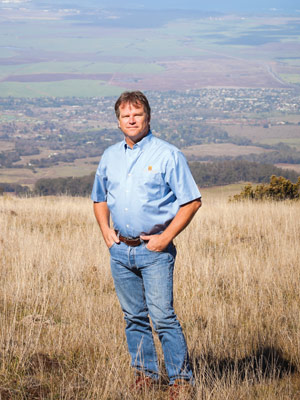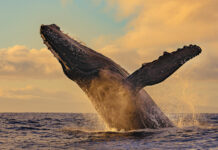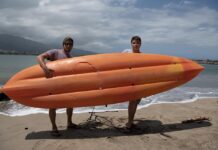 Scott Meidell
Scott Meidell
Range of Opportunities
Anyone who worries about backyard weeds should talk with Scott Meidell. He’s dealing with about 6,000 acres of gorse — confronting a horror that could forever blight the uplands of our greatest mountain.
Sitting in the office of Haleakala Ranch, where he is general manager, Scott exudes calm. His words are soft-spoken, carefully chosen. Dressed in a navy blue HR-logo tee shirt that fits his muscular build, cream-colored jeans, and worn hiking boots with red laces, he directs a red laser-light pointer at a large wall map of East Maui. He describes the ranch’s holdings, “just under 29,000 acres” in four distinct sloping chunks, much of it “dry, windswept pasture, beautiful in its desolation,” and much of it remnant native forest crying for conservation. Here in Makawao, the ranch’s barn-red buildings and stables, white-trimmed, evoke painterly scenes against long green slopes. Breezes burst and fade in the high treetops whose leaves break the pleasant winter sunlight into diamonds. Life at this 125-year-old ranch is easy breezy.
Not.
Says Scott, “There’s an assumption: ‘Leave the back forty alone. It’ll take care of itself.’ That is absolutely not true.” Scott’s calm is really sprezzatura — grace under pressure. He and the ranch are grappling with gorse, fireweed, axis deer, and remorseless drought. To face these unprecedented challenges, Haleakala Ranch under Scott’s leadership is undergoing a solid rethink of its own operations.
Witness the flocks of sheep along Kekaulike, the road heading up to the crater. Motorists have been pulling onto the shoulder to shoot pictures of sprightly lambs leaping about — not a traditional Maui sight. The ranch also manages a herd of 2,000 breeding goats, twice the number of its cattle. The ranch is shifting from cowboy days to a carefully managed multispecies operation.
Gorse — one of Earth’s worst weeds — has forced this change. Gorse replaces its leaves with vicious thorns, then forms landscape-devouring thickets ten feet high. It catches fire easily, then bounces back stronger than before. It scoffs at herbicides, and its seeds — produced in abundance twice a year — remain viable for half a century.
Scott’s job when he first came to the ranch was to bust the gorse. He’d come from well over a decade of labor as field technician in West Maui’s Pu‘u Kukui Watershed, and the ranch wanted his landscape-scale experience with pest control.
“It was a humbling experience. This company has a highly regarded legacy of land stewardship. Fortunately there was a willingness of management to adopt some innovative methods.”
Besides ordering hand-to-shrub combat involving backhoes and shredders (“mechanical removal of the biomass”), Scott began deploying goats to perpetually patrol gorse regrowth. He brought in sheep to browse the lower pastures against fireweed — a dainty-looking yellow flower that kills horses and cows. The future of axis deer is an unsolved problem on Maui, and escalating drought is “the new normal.” About the future of Haleakala Ranch, though, Scott is thoughtfully optimistic.
“We continue to have the support of the family and the directors to pursue novel solutions. As long as we stay open to new ideas, I think we’ll be able to address the challenges of weather and invasive species.”
— Paul Wood





